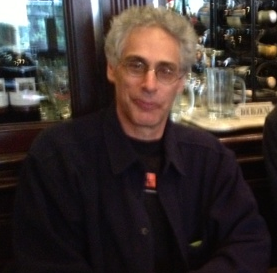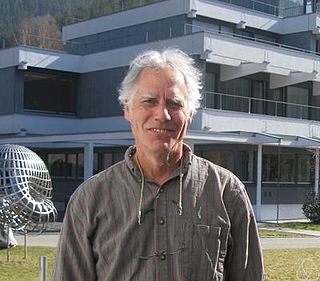
Epidemiology is the study and analysis of the distribution, patterns and determinants of health and disease conditions in a defined population.
A case–control study is a type of observational study in which two existing groups differing in outcome are identified and compared on the basis of some supposed causal attribute. Case–control studies are often used to identify factors that may contribute to a medical condition by comparing subjects who have the condition with patients who do not have the condition but are otherwise similar. They require fewer resources but provide less evidence for causal inference than a randomized controlled trial. A case–control study is often used to produce an odds ratio. Some statistical methods make it possible to use a case–control study to also estimate relative risk, risk differences, and other quantities.

Sir Austin Bradford Hill was an English epidemiologist who pioneered the modern randomised clinical trial and, together with Richard Doll, demonstrated the connection between cigarette smoking and lung cancer. Hill is widely known for pioneering the "Bradford Hill" criteria for determining a causal association.

In causal inference, a confounder is a variable that influences both the dependent variable and independent variable, causing a spurious association. Confounding is a causal concept, and as such, cannot be described in terms of correlations or associations. The existence of confounders is an important quantitative explanation why correlation does not imply causation. Some notations are explicitly designed to identify the existence, possible existence, or non-existence of confounders in causal relationships between elements of a system.

In epidemiology, Mendelian randomization is a method using measured variation in genes to examine the causal effect of an exposure on an outcome. Under key assumptions, the design reduces both reverse causation and confounding, which often substantially impede or mislead the interpretation of results from epidemiological studies.
While epidemiology is "the study of the distribution and determinants of states of health in populations", social epidemiology is "that branch of epidemiology concerned with the way that social structures, institutions, and relationships influence health." This research includes "both specific features of, and pathways by which, societal conditions affect health".

Sander Greenland is an American statistician and epidemiologist with many contributions to statistical and epidemiologic methods including Bayesian and causal inference, bias analysis, and meta-analysis. His focus has been the extensions, limitations, and misuses of statistical methods in nonexperimental studies, especially in postmarketing surveillance of drugs, vaccines, and medical devices. He received honors Bachelor's and master's degrees in mathematics from the University of California, Berkeley, where he was Regent's and National Science Foundation Fellow in Mathematics, and then received Master's and Doctoral degrees in epidemiology from the University of California, Los Angeles (UCLA), where he was Regent's Fellow in Epidemiology. After serving as an assistant professor of biostatistics at Harvard, he joined the UCLA Epidemiology faculty in 1980 where he became Professor of Epidemiology in the Fielding School of Public Health in 1989, and Professor of Statistics in the UCLA College of Letters and Science in 1999. He moved to Emeritus status in 2012 and the following year he was awarded an honorary Doctor of Medicine by the University of Aarhus, Denmark.

James M. Robins is an epidemiologist and biostatistician best known for advancing methods for drawing causal inferences from complex observational studies and randomized trials, particularly those in which the treatment varies with time. He is the 2013 recipient of the Nathan Mantel Award for lifetime achievement in statistics and epidemiology, and a recipient of the 2022 Rousseeuw Prize in Statistics, jointly with Miguel Hernán, Eric Tchetgen-Tchetgen, Andrea Rotnitzky and Thomas Richardson.
Miquel Porta is a Catalan physician, epidemiologist and scholar. He has promoted the integration of biological, clinical and environmental knowledge and methods in health research and teaching, which he has conducted internationally; notably, in Spain, at the University of North Carolina at Chapel Hill, Harvard, Imperial College London, and several other universities in Europe, North America, Kuwait, and Brazil. Appointed by the International Epidemiological Association (IEA), in 2008 he succeeded the Canadian epidemiologist John M. Last as Editor of "A Dictionary of Epidemiology". In the Preface to this book he argues for an inclusive and integrative practice of the science of epidemiology. In September 2023, Porta made public through several social networks a call to suggest changes to the new, 7th. edition of the dictionary. The deadline for such contributions is 30 November 2023.
The Bradford Hill criteria, otherwise known as Hill's criteria for causation, are a group of nine principles that can be useful in establishing epidemiologic evidence of a causal relationship between a presumed cause and an observed effect and have been widely used in public health research. They were established in 1965 by the English epidemiologist Sir Austin Bradford Hill.

Handbook of Religion and Health is a scholarly book about the relation of spirituality and religion with physical and mental health. Written by Harold G. Koenig, Michael E. McCullough, and David B. Larson, the first edition was published in the United States in 2001. Subsequent editions in 2012 and 2023 provide entirely new content as each edition reviews researched published since the previous edition. The book has been discussed in magazines and reviewed in professional journals.
Causal inference is the process of determining the independent, actual effect of a particular phenomenon that is a component of a larger system. The main difference between causal inference and inference of association is that causal inference analyzes the response of an effect variable when a cause of the effect variable is changed. The study of why things occur is called etiology, and can be described using the language of scientific causal notation. Causal inference is said to provide the evidence of causality theorized by causal reasoning.
Boris Sobolev is a Russian-born Canadian health services researcher. He is an author of Analysis of Waiting-Time Data in Health Services Research and Health Care Evaluation Using Computer Simulation: Concepts, Methods and Applications, and is Editor-in-Chief of the Health Services Research series published by Springer Science+Business Media.
The John Templeton Foundation is a philanthropic organization that reflects the ideas of its founder, John Templeton. Templeton became wealthy as a contrarian investor, and wanted to support progress in religious and spiritual knowledge, especially at the intersection of religion and science. He also sought to fund research on methods to promote and develop moral character, intelligence, and creativity in people, and to promote free markets. In 2008, the foundation was awarded the National Humanities Medal. In 2016, Inside Philanthropy called it "the oddest—or most interesting—big foundation around."
Eleanor (Ellie) Jane Murray is a British-Canadian epidemiologist, science communicator, and assistant professor at the Boston University School of Public Health. Throughout the COVID-19 pandemic, Murray created a series of multi-lingual, accessible infographics to communicate information about COVID-19.
Babette Anne Brumback is an American biostatistician known for her work on causal inference. She is a professor of biostatistics at the University of Florida.
Sensitivity analysis studies the relation between the uncertainty in a model-based the inference and the uncertainties in the model assumptions. Sensitivity analysis can play an important role in epidemiology, for example in assessing the influence of the unmeasured confounding on the causal conclusions of a study. It is also important in all mathematical modelling studies of epidemics.
In the field of epidemiology, the causal mechanisms responsible for diseases can be understood using the causal pie model.This conceptual model was introduced by Ken Rothman to communicate how constellations of component causes can lead to a sufficient cause to lead to a condition of interest and that reflection on these sets could improve epidemiological study design. A set of proposed causal mechanisms are represented as pie charts where each pie in the diagram represent a theoretical causal mechanism for a given disease, which is also called a sufficient cause. Each pie is made up of many component factors, otherwise known as component causes represented by sectors in the diagram. In this framework, each component cause represents an event or condition required for a given disease or outcome. A component cause that appears in every pie is called a necessary cause as the outcome cannot occur without it.
Jasjeet "Jas" Singh Sekhon is a data scientist, political scientist, and statistician at Yale University. Sekhon is the Eugene Meyer Professor at Yale University, a fellow of the American Statistical Association, and a fellow of the Society for Political Methodology. Sekhon's primary research interests lie in causal inference, machine learning, and their intersection. He has also published research on their application in various fields including voting behavior, online experimentation, epidemiology, and medicine.
Donna Spiegelman is a biostatistician and epidemiologist who works at the interface between the two fields as a methodologist, applying statistical solutions to address potential biases in epidemiologic studies.






